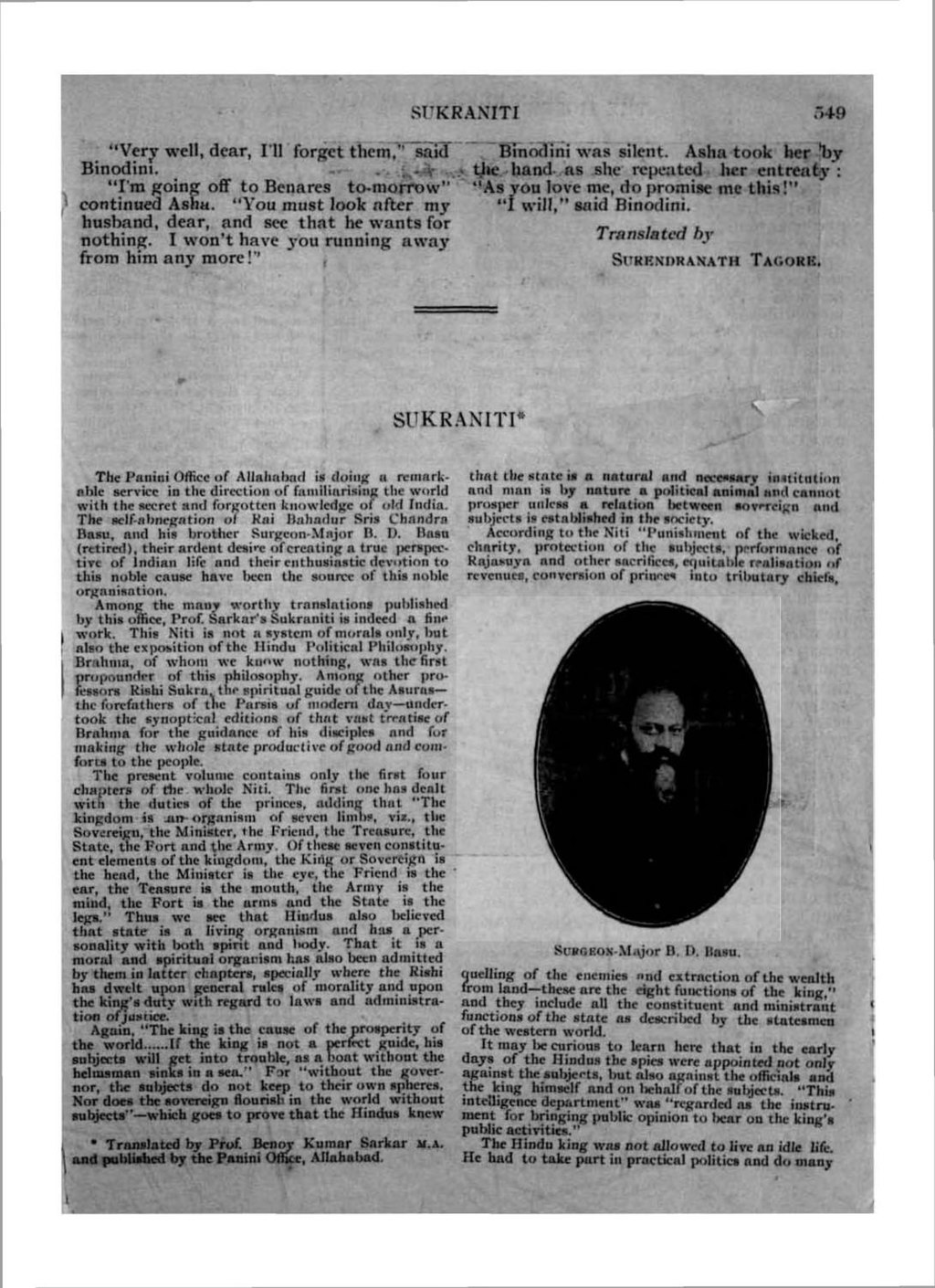"Very well, dear, I'll forget them," said Binodini.
"I'm going off to Benares to-morrow" continued Asha. "You must look after my husband, dear, and see that he wants for nothing. I won't have you running away from him any more!"
Binodini was silent. Asha took her by the hand as she repeated her entreaty: "As you love me, do promise me this!"
"I will," said Binodini.
Translated by
Surendranath Tagore.
SUKRANITI[1]
The Panini Office of Allahabad is doing a remarkable service in the direction of familiarising the world with the secret and forgotten knowledge of old India. The self-abnegation of Rai Bahadur Sris Chandra Basu, and his brother Surgeon-Major B. D. Basu (retired), their ardent desire of creating a true perspective of Indian life and their enthusiastic devotion to this noble cause have been the source of this noble organisation.
Among the many worthy translations published by this office, Prof. Sarkar's Sukraniti is indeed a fine work. This Niti is not a system of morals only, but also the exposition of the Hindu Political Philosophy. Brahma, of whom we know nothing, was the first propounder of this philosophy. Among other professors Rishi Sukra, the spiritual guide of the Asuras—the forefathers of the Parsis of modern day—undertook the synoptical editions of that vast treatise of Brahma for the guidance of his disciples and for making the whole state productive of good and comforts to the people.
The present volume contains only the first four chapters of the whole Niti. The first one has dealt with the duties of the princes, adding that "The kingdom is an organism of seven limbs, viz., the Sovereign, the Minister, the Friend, the Treasure, the State, the Fort and the Army. Of these seven constituent elements of the kingdom, the King or Sovereign is the head, the Minister is the eye, the Friend is the ear, the Teasure is the mouth, the Army is the mind, the Fort is the arms and the State is the legs." Thus we see that Hindus also believed that state is a living organism and has a personality with both spirit and body. That it is a moral and spiritual organism has also been admitted by them in latter chapters, specially where the Rishi has dwelt upon general rules of morality and upon the king's duty with regard to laws and administration of justice.
Again, "The king is the cause of the prosperity of the world......If the king is not a perfect guide, his subjects will get into trouble, as a boat without the helmsman sinks in a sea." For "without the governor, the subjects do not keep to their own spheres. Nor does the sovereign flourish in the world without subjects"—which goes to prove that the Hindus knew that the state is a natural and necessary institution and man is by nature a political animal and cannot prosper unless a relation between sovereign and subjects is established in the society.
According to the Niti "Punishment of the wicked, charity, protection of the subjects, performance of Rajasuya and other sacrifices, equitable realisation of revenues, conversion of princes into tributary chiefs,
quelling of the enemies and extraction of the wealth from land—these are the eight functions of the king," and they include all the constituent and ministrant functions of the state as described by the statesmen of the western world.
It may be curious to learn here that in the early days of the Hindus the spies were appointed not only against the subjects, but also against the officials and the king himself and on behalf of the subjects. "This intelligence department" was "regarded as the instrument for bringing public opinion to bear on the king's public activities."
The Hindu king was not allowed to live an idle life. He had to take part in practical politics and do many
- ↑ Translated by Prof. Benoy Kumar Sarkar M.A. and published by the Panini Office, Allahabad.


